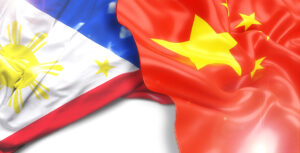
One China Policy hampers Manila-Taiwan trade, says health sector executive
By Beatriz Marie D. Cruz, Reporter
TAIPEI — The Philippine government’s adherence to the One China Policy could be restricting potential trade and investment opportunities with Taiwan, according to a hospital industry executive who attended the recent Healthcare+ Expo, here.
“There are some problems between the trade between Taiwan and the Philippines probably because of the One China Policy,” Jose Rene D. de Grano, president of the Private Hospitals Association of the Philippines, Inc., told BusinessWorld on the sidelines of the expo last November.
He noted how particular imports from Taiwan may not be accepted by the Department of Health (DoH) because of the One China Policy, which states that Taiwan is part of China.
In April, Chinese Ambassador Huang Xilian asked the Philippines to oppose Taiwan’s independence if the country “cares genuinely” about the welfare of more than 150,000 overseas Filipino workers (OFW) there.
Anthony B. Rivera, director for commercial affairs at the Philippine Trade and Investments Center in Taipei (PTIC-Taipei), said the One China Policy is not discussed in investment and trade talks between Philippine and Taiwanese businesses.
“[The] One China Policy… is beyond what we do because what we do is really offer opportunities for both trade and investment. We focus on the business,” Mr. Rivera said also on the sidelines of the expo.
President Ferdinand R. Marcos, Jr. in February gave the United States access to four more military bases on top of five existing sites under the 2014 Enhanced Defense Cooperation Agreement (EDCA) with Washington. But he ruled out the use of Philippine military bases to launch offensives.
Ongoing tensions between Manila and Beijing were underscored by a recent incident where Filipino officials accused the Chinese Coast Guard of using a water cannon and ramming Philippine civilian boats on a resupply mission to troops stationed at the Second Thomas Shoal.
Mr. De Grano pointed out that products, especially healthcare technology, are cheaper if bought directly from Taiwan than in China or the United States, noting how the latter also procures manufacturing parts from Taiwan.
However, he cautioned Philippine hospitals to prioritize equipment with longer warranties over lower costs.
Jose P. Santiago, Jr., the incoming president of the Philippine Hospitals Association (PHA), stressed the need for the government to improve infrastructure and mobility across the country to facilitate the distribution of healthcare technologies to various regions, including isolated areas.
“We’re separated by islands, so the infrastructure is really very important,” he stated in a separate interview with BusinessWorld.
Mr. Santiago also noted potential cost savings through increased manufacturing collaboration with Taiwan, particularly in the healthcare technology sector. “It will probably be cheaper to manufacture that machine or that technology in the country (Philippines)… [and] you can get tax incentives,” he said.
During the PHA’s 74th National Convention, Health Secretary Teodoro J. Herbosa outlined a plan to establish at least one hospital per province.
Mr. Santiago envisioned a substantial increase in the demand for technology and equipment under such a plan, saying: “Could you imagine how the big demand for technology and equipment [would be]? So if there’s a [Taiwanese] manufacturing plant, it could be more affordable [for us].”



